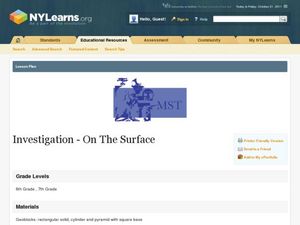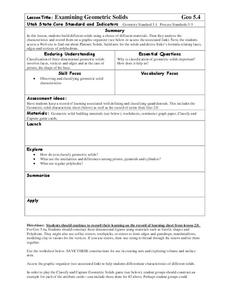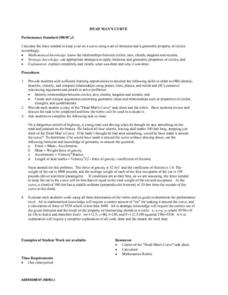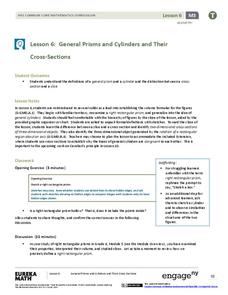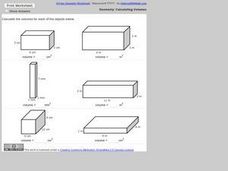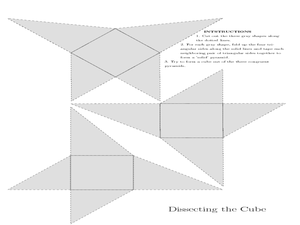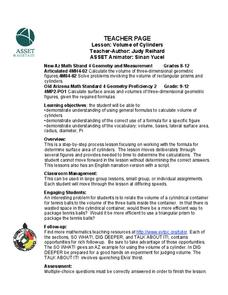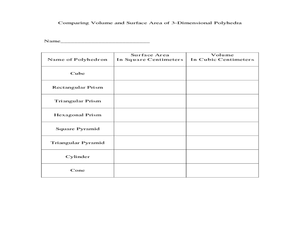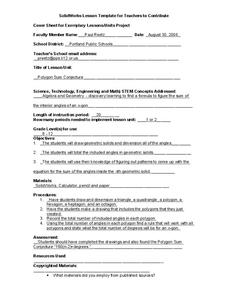Curated OER
Pyramids and Prisms: Guler's Formula
Sixth graders detect and categorize the attributes of geometric shapes to solve problems. In this geometry lesson, 6th graders construct a variety of polyhedra. Students recognize the relationships between two dimensional and three...
Curated OER
Investigation- On The Surface
Students will examine solids to determine which has the least surface area. They will also understand the use of units, square units, and cubic units. There is also the teaching and application of geometry formulas to perform calculations.
Curated OER
Transformations in the Coordinate Plane
Your learners connect the new concepts of transformations in the coordinate plane to their previous knowledge using the solid vocabulary development in this unit. Like a foreign language, mathematics has its own set of vocabulary terms...
Curated OER
Volume of a Cylinder
Middle and high schoolers calculate the volume of cylinders. They measure the height, radius and diameter of cylinders. Following given formulas, students calculate the area and volume of the cylinder. They compare cylinders and predict...
Curated OER
Examining Geometric Solids
Students explore geometry by completing a math worksheet in class. In this shape identification lesson, students identify the characteristics associated with 15 solid geometric shapes. Students identify patterns between vertices, edges...
Curated OER
Investigating: Finding the Volume
Sixth graders explore geometry by utilizing colored cubes in class. In this volume lesson, 6th graders identify the different shapes they can create using their colored cubes and identify the formula for finding volume. Students create...
Curated OER
DEAD MAN'S CURVE
Ninth graders, after being given a unique scenario and a task sheet on Dead Man's Curve, calculate and explain the force needed to keep a car on a curve using a set of formulas and a geometric property of circles. They utilize and create...
Curated OER
Garden Variety Geometry
Learners prepare to take the GED by reviewing basic math concepts. In this geometry lesson, students review vocabularies such as formula, perimeter, circumference and other important geometric terms. They convert between the English and...
EngageNY
General Prisms and Cylinders and Their Cross-Sections
So a cylinder does not have to look like a can? By expanding upon the precise definition of a rectangular prism, the lesson plan develops the definition of a general cylinder. Scholars continue on to develop a graphical organizer for the...
Curated OER
Calculating Volumes
In this geometry worksheet, students, calculate the volume given the sides of the shapes. There are 6 questions dealing with volumes.
Curated OER
Dissecting the Cube
Students investigate the volume of cones. In this geometry lesson, students define the formula to find the volume of cones. They define the concept of having to dissect a three dimensional figure and find the volume.
Houston Area Calculus Teachers
Area and Volume
An AP calculus lesson begins with an activity to determine the volume of a solid using a cross-section. Next, learners review the ways to find the area between two curves , as well how to find the volume of a solid created from the...
Curated OER
Geometry and Tony Smith Sculpture
Learners respond to Tony Smith's sculpture as art and brainstorm about math concepts inherent in his work. They create a sculpture with polyhedra nets, calculate the cost of covering sculpture in gold, and write an exhibit label for...
Curated OER
Area of Solids
Students find the area of rectangular solids and cylinders by cutting them into flat pieces and adding the areas.
EngageNY
The Volume of Prisms and Cylinders and Cavalieri’s Principle
Young mathematicians examine area of different figures with the same cross-sectional lengths and work up to volumes of 3D figures with the same cross-sectional areas. The instruction and the exercises stress that the two figures do not...
Curated OER
Volume of Cylinders
Middle and high schoolers calculate the volume of cylinders. In this geometry lesson plan, learners differentiate between rectangular prisms and cylinders. They use the correct formula to solve for each solid.
PBS
Surface Area and Volume
You and your class will like this lesson plan on using visual models to relate the volume and surface area of solid shapes. Learners construct three-dimensional forms using nets. They calculate the surface area and volume for each and...
Curated OER
Volume Worksheet I
For this volume worksheet, students recognize three-dimensional figures, identify the proper volume formula, and then solve the equation by inserting information from a diagram into the formula. Students solve six equations.
Curated OER
Geometry: Calculating Volumes
In this volume learning exercise, students find the volume of 8 prisms. Students are given the length, width, and height of each prism.
Curated OER
Volume and Surface Area of Right Rectangular Prisms
Students identify the formulas for three-dimensional figures. They use manipulatives to model problems. Students create foldables and explain volume and surface area. Students complete worksheets and classify solids. Students sing a...
Curated OER
The Value of Volume
Students measure the perimeter and area of their polygons. For this geometry lesson, students calculate the volume and area using the correct tools. They calculate the time and temperature and the perimeter and side lengths of triangles.
Curated OER
Volume
Young scholars, after reviewing the measuring of the lengths of sides of different shapes along with the calculation of their perimeters and areas, encounter what it means by the 'perimeter' of a polygon. They practice measuring units of...
Curated OER
Volume of Spheres
Students find the volume of spheres. In this geometry lesson, students measure and derive the formula for each shape and solid. They use the correct terminology and units when solving these problems.
Curated OER
Polygon Sum Conjecture
Students calculate the sum of the angles of a polygon. In this geometry lesson, students use the interior angle formula of polygon based on the number of sides of the polygon. They identify the missing angle using algebra.



